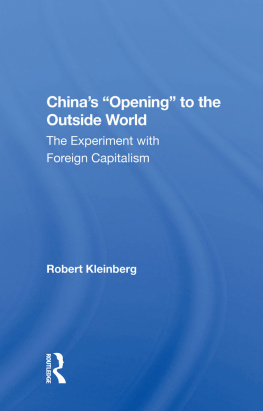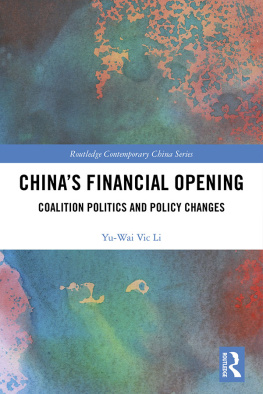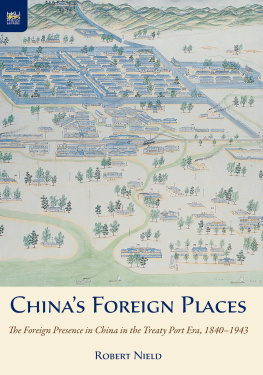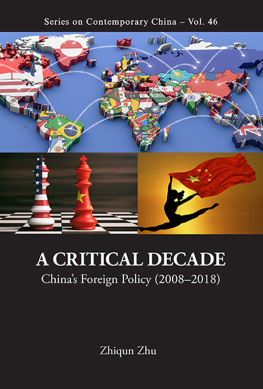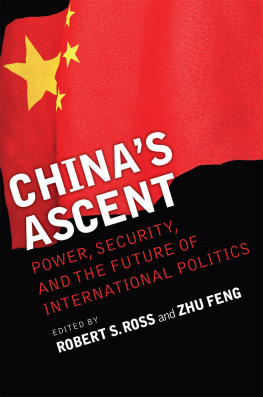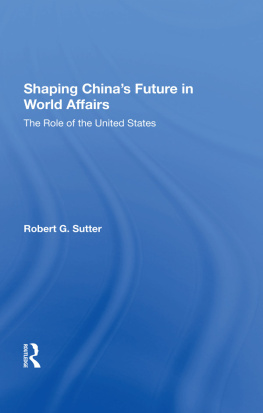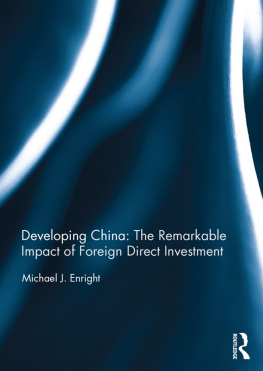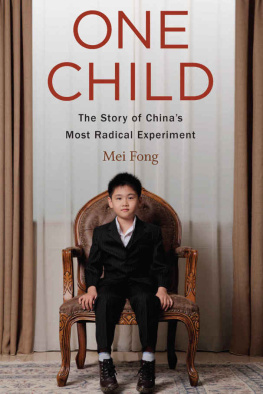Robert Kleinberg - Chinas Opening to the Outside World: The Experiment With Foreign Capitalism
Here you can read online Robert Kleinberg - Chinas Opening to the Outside World: The Experiment With Foreign Capitalism full text of the book (entire story) in english for free. Download pdf and epub, get meaning, cover and reviews about this ebook. year: 2019, publisher: Taylor & Francis Group, genre: Politics. Description of the work, (preface) as well as reviews are available. Best literature library LitArk.com created for fans of good reading and offers a wide selection of genres:
Romance novel
Science fiction
Adventure
Detective
Science
History
Home and family
Prose
Art
Politics
Computer
Non-fiction
Religion
Business
Children
Humor
Choose a favorite category and find really read worthwhile books. Enjoy immersion in the world of imagination, feel the emotions of the characters or learn something new for yourself, make an fascinating discovery.
- Book:Chinas Opening to the Outside World: The Experiment With Foreign Capitalism
- Author:
- Publisher:Taylor & Francis Group
- Genre:
- Year:2019
- Rating:5 / 5
- Favourites:Add to favourites
- Your mark:
- 100
- 1
- 2
- 3
- 4
- 5
Chinas Opening to the Outside World: The Experiment With Foreign Capitalism: summary, description and annotation
We offer to read an annotation, description, summary or preface (depends on what the author of the book "Chinas Opening to the Outside World: The Experiment With Foreign Capitalism" wrote himself). If you haven't found the necessary information about the book — write in the comments, we will try to find it.
Robert Kleinberg: author's other books
Who wrote Chinas Opening to the Outside World: The Experiment With Foreign Capitalism? Find out the surname, the name of the author of the book and a list of all author's works by series.
Chinas Opening to the Outside World: The Experiment With Foreign Capitalism — read online for free the complete book (whole text) full work
Below is the text of the book, divided by pages. System saving the place of the last page read, allows you to conveniently read the book "Chinas Opening to the Outside World: The Experiment With Foreign Capitalism" online for free, without having to search again every time where you left off. Put a bookmark, and you can go to the page where you finished reading at any time.
Font size:
Interval:
Bookmark:

52 Vanderbilt Avenue, New York, NY 10017
2 Park Square, Milton Park, Abingdon, Oxon OX14 4RN
Product or corporate names may be trademarks or registered trademarks, and are used only for identification and explanation without intent to infringe.
Kleinberg, Robert.
China's "opening" to the outside world: the experiment with foreign capitalism.
p. cm.
Includes bibliographical references and index.
ISBN 0-8133-7904-0 (hardcover)ISBN 0-8133-8089-8 (pbk.)
1. ChinaEconomic policy1976- . 2. Shen-chen Special Economic Zone (Shen-chen shih, China). 3. Investments, ForeignChina. 4. ChinaCommercial policy. 5. ChinaForeign economic relations. I. Title.
HC427.92.K55 1990
338.951'27dc20
CIP
- FBIS U.S. Government, Foreign Broadcast Information Service, Daily Report, People's Republic of China
- FEER Far Eastern Economic Review
- JPRS U.S. Joint Publications Research Service, Translations on the People's Republic of China (Washington, D.C.: U.S. Government Printing Office)
- SCP U.S. Department of Commerce, Survey of People's Republic of China Press (Hong Kong: U.S. Consulate General)
- SWB British Broadcasting Corporation, Summary of World Broadcasts, Part 3, The Far East (Reading, England)
Introduction
Font size:
Interval:
Bookmark:
Similar books «Chinas Opening to the Outside World: The Experiment With Foreign Capitalism»
Look at similar books to Chinas Opening to the Outside World: The Experiment With Foreign Capitalism. We have selected literature similar in name and meaning in the hope of providing readers with more options to find new, interesting, not yet read works.
Discussion, reviews of the book Chinas Opening to the Outside World: The Experiment With Foreign Capitalism and just readers' own opinions. Leave your comments, write what you think about the work, its meaning or the main characters. Specify what exactly you liked and what you didn't like, and why you think so.

